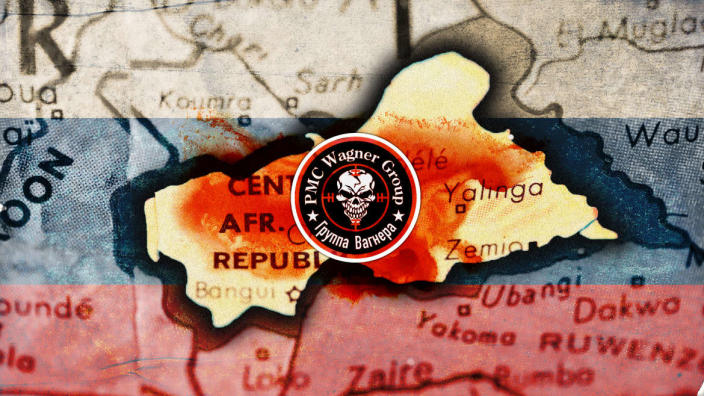
EBAM, Cameroon—Ella* and Béatrice*—both 16—returned from visiting a friend earlier this year to discover that their homes were on fire.
Friends and neighbors, who had lost almost everything, were wailing uncontrollably as their whole compound in the Central African Republic village of Aïgbado was engulfed in flames.
It was Jan. 16, the day of an infamous massacre—first reported by The Daily Beast—when Putin’s private army slaughtered more than 70 people in eastern CAR, setting homes ablaze and leaving hundreds homeless near a gold mine outside Aïgbado.
On the sandy ground outside their compound, the girls said they saw two dead bodies riddled with bullet wounds.They couldn’t believe what they had witnessed, and would never have imagined that their ordeal was soon to become even worse.
Once their homes had been burned down, they fled to a refugee camp where they say they were held against their will and repeatedly raped by white men believed to be soldiers hired by the Wagner Group.
Survivors Say Russian Mercenaries Slaughtered 70 Civilians in Gold Mine Massacre
The infamous Wagner Group is run by one of President Putin’s closest associates, Yevgeny Prigozhin, who sends the mercenaries all over the world on secretive missions that the Kremlin wants to keep off the books. The private army has served extensively in Syria, several African countries, and now in Ukraine, where it has been accused of war crimes.
Russian businessman Yevgeny Prigozhin in 2016 in Vladivostok, Russia.
” data-src=”https://s.yimg.com/ny/api/res/1.2/UGmMivT4UiHnEg4gCsvUwQ–/YXBwaWQ9aGlnaGxhbmRlcjt3PTcwNQ–/https://s.yimg.com/uu/api/res/1.2/SOXAVp_MWIbVPsRsKe8GlA–~B/aD0wO3c9MDthcHBpZD15dGFjaHlvbg–/https://media.zenfs.com/en/thedailybeast.com/9ef05c350087955c6ee76128e0183749″><img alt="
Russian businessman Yevgeny Prigozhin in 2016 in Vladivostok, Russia.
” src=”https://s.yimg.com/ny/api/res/1.2/UGmMivT4UiHnEg4gCsvUwQ–/YXBwaWQ9aGlnaGxhbmRlcjt3PTcwNQ–/https://s.yimg.com/uu/api/res/1.2/SOXAVp_MWIbVPsRsKe8GlA–~B/aD0wO3c9MDthcHBpZD15dGFjaHlvbg–/https://media.zenfs.com/en/thedailybeast.com/9ef05c350087955c6ee76128e0183749″ class=”caas-img”>
Russian businessman Yevgeny Prigozhin in 2016 in Vladivostok, Russia.
Mikhail Svetlov/Getty
The mercenaries have been in CAR for four years and accused of carrying out a host of barbaric acts including the Aïgbado assaults, which led to Ella and Béatrice immediately fleeing to a makeshift Internally Displaced Persons camp in nearby Bria, a regional capital.
Instead of refuge, they say they found more torment at the hands of the European soldiers who they say kidnapped them, took them to a second location and subjected them to repeated sexual assaults.
“For us, it was like we were living in hell,” said Béatrice. “We kept begging them to have mercy on us but they didn’t listen. They made us bleed.”
In mid February, the girls say a number of Russian mercenaries showed up at the camp in Bria and separated young girls from the rest of the refugees. They then allegedly picked a dozen adolescent girls, including Ella and Béatrice, and ordered them into their trucks and drove them to a camp in Bossangoa where they were kept for weeks and raped.
“From the first day we arrived [at Bossangoa], the white soldiers, so many of them, started to molest us,” said Ella. “If you tell them to stop, they’ll beat you up mercilessly and threaten to send you to the bush so that rebels will rape you.”
Throughout their stay in Bossangoa, the Russians brought in other young women they seized from various locations in the town, according to Béatrice who said the mercenaries “had no regard for the women” in the area.
“The [local] women were treated worse than those of us who came from far,” said Béatrice. “They were not only sexually abused, but were beaten regularly for no reason. It was as if the women in the town did something wrong.”
In the last 18 months, the town has witnessed quite a number of Russian atrocities. Last year, CNN reported that a United Nations drone video obtained and geolocated by the network showed homes being burned very close to the town on Feb 23, with the UN stating afterwards that “bilateral forces”—referring to Russian paramilitaries and CAR’s army—“burned homes in a village situated 13 kilometers from Bossangoa.” Months later, 12 civilians were reportedly killed in the town by Wagner mercenaries after they were arrested while riding their motorbikes. The victims were mostly artisanal miners and traders, who are often the target of Russian paramilitaries with keen interest in CAR’s gold deposits.
In the middle of March, after spending over three weeks in Bossangoa, Ella and Béatrice, along with four other girls, were taken to the town of Bouar, close to the Cameroonian border, where they said they were further raped and abused by another group of Russian mercenaries in what constitutes sex trafficking.
“They kept us there for weeks and turned us to their slaves,” Ella said. “If any girl said she was pregnant, they’ll just invite a doctor for an abortion. I saw them do it to three girls.”
There were over a dozen Russians involved in the abusive acts, according to Ella who said girls were often taken to an empty room and a few paramilitaries sometimes watched as their colleagues took turns to rape the girls.
“We could hear girls scream as they were being raped,” she said.
In the last few years, Russia has expanded its influence in CAR, a country engulfed by coups and conflicts over the past two two decades. President Faustin-Archange Touadéra, whose government controls only the capital, Bangui—the rest of the country is in rebel hands—turned to the Kremlin in 2017 for help in securing arms and paramilitaries following the inability of UN peacekeepers to extend the state’s writ. Mercenaries from the Wagner Group showed up not long after, perpetrating abuses that increasingly drive violence in the provinces and having a say in political and economic matters in the country.
At the end of January, Wagner began pulling some of its personnel—estimated at between 1,200 and 2,000—out of CAR to Eastern Europe to support Russian forces fighting in Ukraine. Some of its bases were shut and mercenaries that remained in the country were constantly shuffled around. When those in Bouar were redeployed in April, Ella and Béatrice, along with the other girls, were kicked out of the base by their replacements. The girls fled to Ngaoundere in the central Adamawa region of Cameroon, where thousands of CAR refugees have settled, before later moving to Ebam town, not far away from the commercial city of Mamfe, in southwestern Cameroon, where a CAR national is accommodating dozens of refugees from his country and helping them find menial jobs.
“It’s just my way of helping my compatriots do something meaningful,” said Laurent Nkeme, who has lived in Cameroon for close to two decades and owns a number of farms in the southwest of the country. “I’m going to support the girls in every way I can and help them return to school.”
Ella and Béatrice arrived in southwestern Cameroon in early May with help from a commercial transport operator who told them they could get opportunities in the region. Since their arrival, they’ve been working part-time in cassava and yam farms owned by Nkeme’s friends and are paid between $3 and $5 a day for their efforts.
Putin’s Private Army Accused of Raping New Moms on Maternity Ward
More than 300,000 Central Africans, who’ve suffered decades of severe hardship, live in Cameroon as refugees. The vast majority live in eastern and central parts of the country, but a handful are scattered around western Cameroon, where fighting between government forces and English-speaking separatists have created a security crisis and forced tens of thousands to flee to Nigeria.
“There was a time when armed men invaded the cassava farm but we were lucky to escape,” said Béatrice. “The people here say that happens so often.”
The teenage girls from CAR don’t feel entirely safe in Cameroon’s southwest but with conflicts and hardships everywhere around them, they have almost no alternatives. Home is where they wish to return but the thought of encountering the Russians again continues to scare them.
“We’d like to see our family and friends again,” said Béatrice. “But I fear that we’ll meet those white soldiers again and they’ll abuse us.”
*Names changed to protect identity.
Get the Daily Beast’s biggest scoops and scandals delivered right to your inbox. Sign up now.
Stay informed and gain unlimited access to the Daily Beast’s unmatched reporting. Subscribe now.




